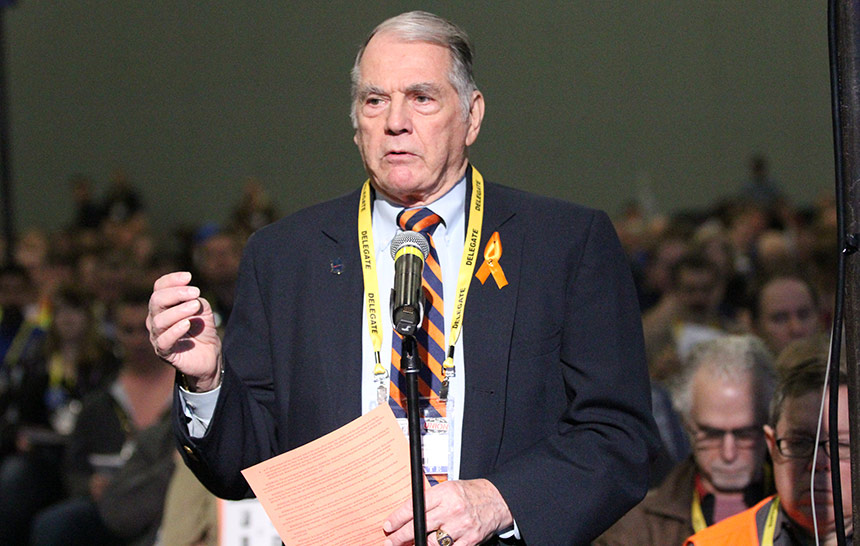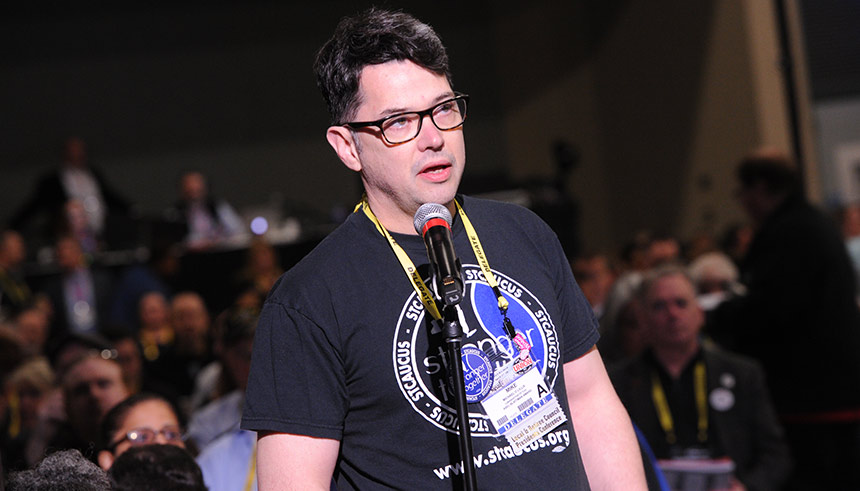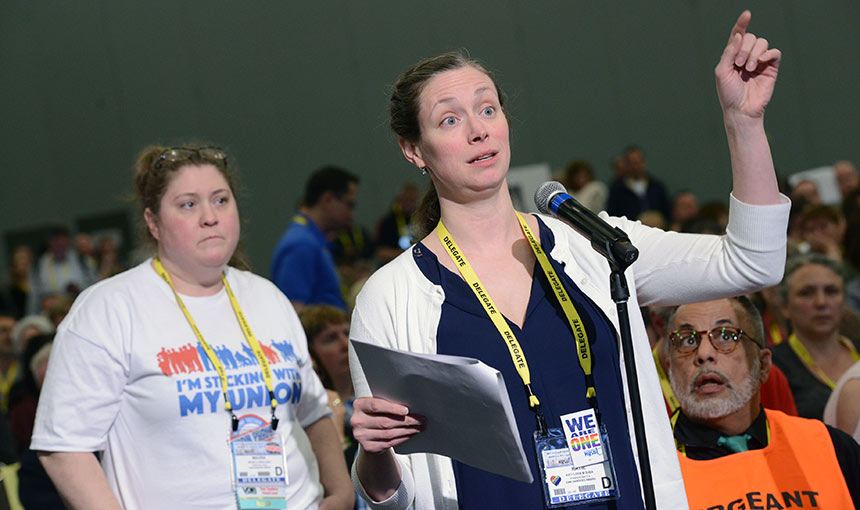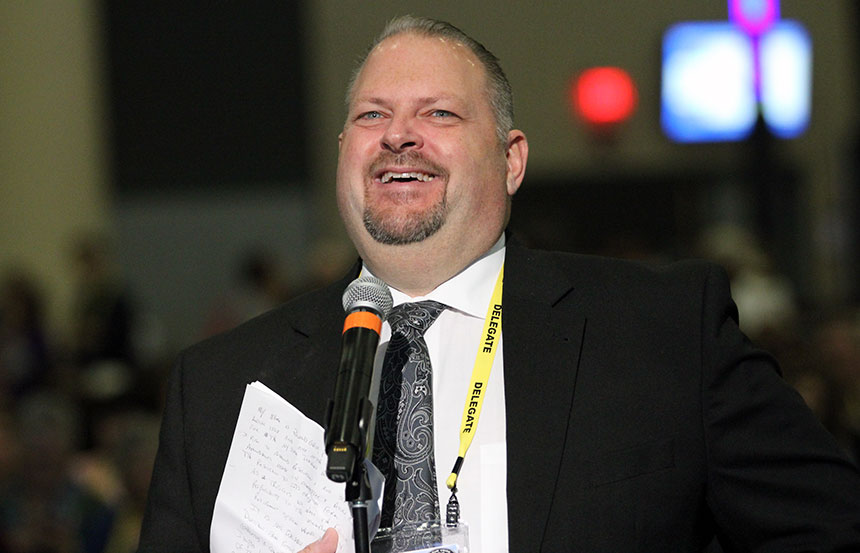Advocacy for students, member engagement and relentless political action will all remain front and center for the union in the coming year, as delegates at this weekend’s policymaking convention in Buffalo urged NYSUT to be union proud and strong.
In all, Representative Assembly delegates approved 27 resolutions, five special orders of business and referred 14 measures to the NYSUT Board of Directors for further action. One resolution failed.
The union’s ongoing fight against unfair and inappropriate testing will ramp up in the coming year, as the approximately 1,750 delegates approved a number of resolutions railing against the state’s testing madness.
Delegates approved a resolution sounding the alarm on the State Education Department’s rush to computer-based testing. The resolution calls for SED to provide research-based studies on the validity and reliability of computerized testing; for additional funding to support districts that choose to move to computerized testing; and for NYSUT to form a committee to examine numerous implementation issues.
In another testing matter, delegates called for SED and the Board of Regents to adopt a clear policy prohibiting schools from punishing or stigmatizing students whose parents opt them out of state testing.

“This is a very serious situation in Buffalo and other districts, too,” said Buffalo Teachers Federation President Phil Rumore (pictured above), who said students whose parents opted them out of state tests were not allowed to go on field trips, attend ice cream socials or enjoy other incentives. In addition, Rumore reported some administrators falsely refused to accept opt-out notes on the day of the test and told teachers that students — even those as young as third grade — had to verbally refuse to take the test. Some principals directly called parents, Rumore said, urging them to reverse their decisions and telling them their children would not be able to take advanced courses if they did not sit for the exams.
“This is brutalizing and it has to end before the next batch of tests,” Rumore said. “Let’s say never again will our students be humiliated and stigmatized because their parents are doing what they believe … and we know is best for them.”
Delegates also approved a special order of business asking the Board of Regents to convene a study of the negative unintended consequences tied to New York’s grades 3–8 standardized assessments.

“When Commissioner Elia was asked directly at this week’s local presidents conference … she could not cite a single unintended negative consequence,” said Lakeland FT’s Michael Lillis (pictured above). “This level of denial leaves New York’s students susceptible to continued emotional abuse with no protections in place, or hope of improvement.”
It’s time for SED to solicit feedback about the emotional experience of students as they take the assessments, the time spent throughout the year preparing students for assessments, the impact of untimed tests on students and the narrowing of the curriculum, delegates agreed. If the Board of Regents and SED refuse to conduct such a survey, the resolution urges NYSUT to do its own study.

In other educational policy measures, delegates including Pittsford TA's Kathleen Shea (pictured above at mic) urged NYSUT to support legislation that would require students entering kindergarten to be 5 years old by Sept. 1 of the year they are attending kindergarten.
“As a kindergarten teacher and the parent of a child who would have been four (entering school), I’m telling you these children are not ready for what’s expected now,” said Gouverneur TA’s Pam Mahay. “Socially and emotionally they’re not ready for this.”
Mahay offered a long list of expectations, including being able to write five-sentence paragraphs for computer-based testing. The resolution was amended to exempt schools with public pre-K, after delegates questioned what would happen to children who completed preschool but were not 5 years old by Sept. 1.
Delegates also called for NYSUT to offer workshops through the Education & Learning Trust to educate teachers and School-Related Professionals about transgender students. They directed NYSUT to continue advocating for adequate funding for teacher centers so that all schools regardless of size, poverty or geography may have access to high-quality professional development.
To help ease acute teacher shortages in BOCES special education programs, delegates directed NYSUT to urge the Regents and commissioner of education to change certification regulations to allow BOCES educators to teach outside their grade-level certification and content specialty.
In another certification issue, delegates urged NYSUT to petition the State Education Department to allow up to two years spent in teaching assistant positions to count toward the experience requirement for professional teacher certification.
Political action and civil rights
Delegates approved several resolutions in the political action/human rights arena.
After an emotional appeal by UFT Vice President Evelyn DeJesus, delegates approved a special order of business in solidarity with educators in Puerto Rico. In the aftermath of Hurricane Maria, hundreds of schools in Puerto Rico are facing closure, while corporate privateers are using the disaster to dismantle public education and erode worker rights.
“Our brothers and sisters are hurting. I’m hurting and I’m angry. And I want you to be angry!” said DeJesus, a NYSUT Board member who has joined American Federation of Teachers President Randi Weingarten to deliver water filters and other essential emergency supplies since Hurricane Maria devastated the island.
“We’re saying enough is enough. This is inhuman and should not be allowed!”
The special order resolves for NYSUT to work in solidarity with the Puerto Rico teachers’ union and other trade unions to find solutions that “advance our shared values of public education and worker rights through collective bargaining.”
A number of resolutions direct NYSUT to continue ongoing lobbying efforts in Albany. One calls for NYSUT to continue seeking repeal of the state’s property tax cap and, until that happens, the union must advocate for amendments to mitigate some of the law’s worst effects.
A parity resolution calls for NYSUT to work with SED and the Division of Budget to gain legislation for an annual automatic increase in funding to the Section 4201 Special Act Schools. The increase would be tied to the percent increase in state personal income levels or aid to public schools, whichever is greater.
Another resolution for Special Act School Districts directs NYSUT to advocate for an Excessive Direct Care Staff Turnover Prevention Grant program to help Special Acts, 853, 4410 and 4201 Schools retain school counselors, social workers, school psychologists, physical therapists, occupational therapists, school nurses and other certified staff.
Delegates also called for NYSUT to urge its national affiliates, AFT and NEA, to conduct a new lobbying and public relations campaign to secure more federal funding for special education.
Delegates also urged the statewide union to endorse the Poor People’s campaign and share activities for its local affiliates and retiree councils to participate during the 50th anniversary of Martin Luther King’s Poor People’s March on Washington.
Delegates also directed NYSUT to seek legislative support for the return of the Excellence in Teaching/Teacher Support Aid to boost teacher salaries and reduce pressure on local property taxes.
In civil and human rights resolutions, delegates urged NYSUT to support the rights and dignity of all immigrants and advocate on behalf of members and students who could face deportation. NYSUT shall continue to strongly oppose ICE entering any public school and removing any students.
In a resolution aimed at ending violence against women, delegates called on NYSUT to advocate for the development of a prevention program for middle school, high school and college students.

On a resolution calling for legislative and educational efforts on climate change, there was considerable debate after delegates tried to insert language urging the New York State Teachers’ Retirement System to divest itself of fossil fuel company investments. TRS teacher representative Ron Gross (pictured above) of William Floyd United Teachers spoke against the amendment, saying the board would first need to study whether such a move would be fiscally responsible. “We must first protect the health of the retirement funds,” he said. Teacher representatives from the New York City TRS agreed, saying their board is already studying the issue.
UFT’s Tom Brown, a teacher representative on the New York City TRS board said maintaining investments in fossil fuel companies “allows us to be activist investors.”
But Lauren Goldblatt-Kirkwood of Burnt Hills Ballston Lake TA countered: “It’s a human rights issue. Climate change is real, coming, and requires action. I think we can put our money in other lucrative investments that are not harmful to the environment.”
In the end, the original resolution was approved with no amendments concerning divestiture.
A resolution calling on NYSUT to condemn “America’s forever wars” and support antiwar groups was defeated.
Higher education
In higher education resolutions, delegates demanded that Columbia University at long last come to the table and bargain in good faith with striking graduate workers. Delegates also approved a measure calling for a fair funding plan for SUNY and community colleges, including a minimum level of state aid and creation of a task force including labor representatives to recommend a strong stable funding formula.
Another resolution directed NYSUT to advocate for greater funding to meet the increased demands resulting from the state’s Excelsior Scholarship program that offers free tuition to eligible students. Both CUNY and SUNY have reported a dramatic increase in applications and the governor’s office has projected an additional 27,000 students will qualify for the award. “Greater access to public higher education must be accompanied by greater funding,” the resolution states.
Health and safety
On health and safety issues, delegates approved resolutions calling for NYSUT to promote safety with automatic prescription refills; urge the New York State School Boards Association to make opioid overdose prevention training mandatory; and pressure state lawmakers to enact legislation requiring temperatures inside school to be between 68 degrees and 76 degrees when students and teachers are in the building.
Delegates also urged NYSUT to publicize how the state’s Safe Patient Handling Law, approved in 2014, has helped protect workers and led to reduced workers’ compensation rates for health care facilities.
Delegates also called for local union representation on school district health care consortiums and directed NYSUT to take legal action concerning possible violations of labor law and the Taylor Law by some health consortiums.
Pensions/retirement
Delegates approved resolutions calling for NYSUT to encourage the state and local retirement systems to allow educators to buy back time accrued in private schools, colleges and universities and hospitals.
Other retirement-related measures called for NYSUT to work with the state AFL-CIO and other unions to seek comprehensive legislative changes to address the many inequities within Tier 6; and an informational campaign to educate members on the importance of lowering 403(b) investment fees.
Organizational matters
With the anti-union Janus case pending in the U.S. Supreme Court, delegates directed NYSUT to continue educating members about the case and continue its all-out campaign to commit members to pledge to stay in the union.
In addition, delegates approved resolutions directing NYSUT to support opportunities for early childhood educators and paraprofessionals who wish to become NYSUT members; and assist retiree councils in increasing participation of new and current retirees in local, chapter and council initiatives.
Delegates referred the following to the NYSUT Board of Directors for further study on whether to:
- urge national affiliates to form a special task force to study the issue of corporate influence on curriculum and teaching methodologies;•
- educate and mobilize support for universal health care coverage;
- advocate for expanded early voting procedures;
- launch a voter registration drive for eligible high school students;
- support the Professional Staff Congress/CUNY campaign for fair adjunct pay, which calls for a minimum of $7,000 per 3-credit course;
- make professional autonomy for educators a top priority as part of efforts to ease the teacher shortage;
- work with national affiliates to lobby Congress to reestablish a National Teacher Corp as another way to ease the looming teacher shortage;
- continue to raise funds for communities affected by hurricanes and other natural disasters;
- support the restoration of The Kate Mullany National Historic Site;
- support education programs of the American Labor Studies Center and encourage teachers to use its curriculum materials;
- support legislation to give school districts the flexibility to collect their own school taxes;
- support legislation to voluntarily allow school boards to create wards for school board elections;
- encourage locals to share teaching materials to help students make an informed decision regarding military service and ROTC; and
- form a committee to amend the NYSUT Constitution and Bylaws.